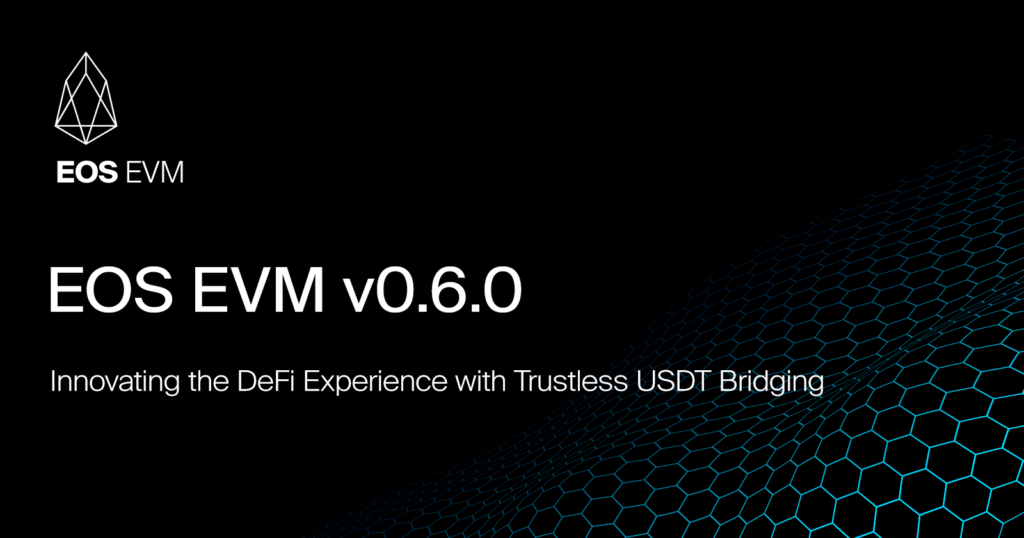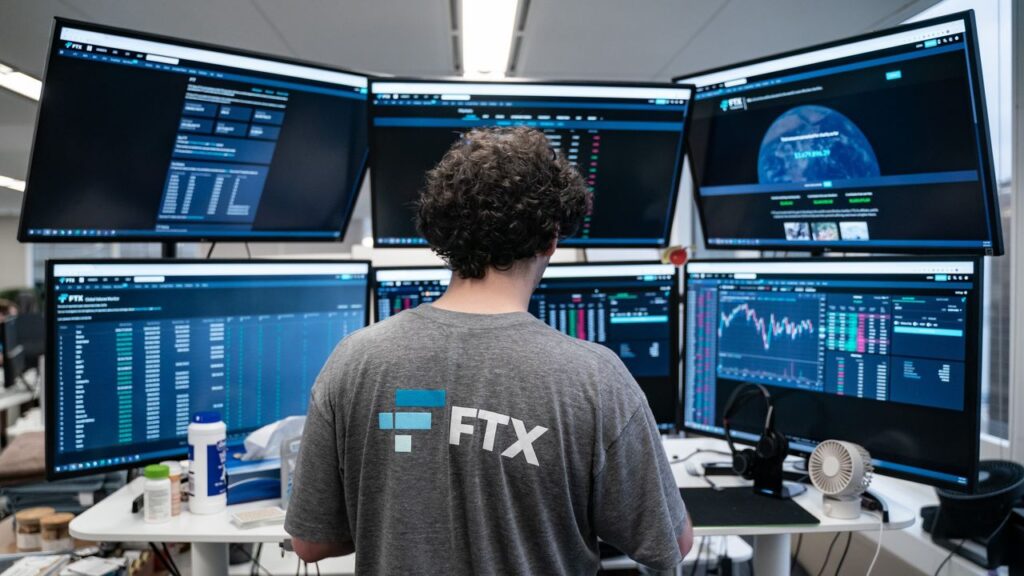The EOS EVM v0.6.0 is almost live, bringing a number of interesting goodies to the platform’s new EVM environment, most notably natively bridged USDT.
Since its launch in April, the EOS EVM has seen a flurry of upgrades that make it a surprisingly unique EVM environment, which uses EOS’s underlying stack to create one of the fastest blockchain environments for EVM transactions.
The latest update is now bringing EOS USDT as a native token that can be bridged to the EOS EVM, as previously only EOS could be transferred trustlessly. The release also brings important technical updates to enhance interoperability with the native EOS environment.
Now, smart contracts on EOS can execute functions on the EVM, while smart contracts on the EVM can send messages to the native VM, which helps integrate the two deployments. EOS currently has $71M in TVL according to DefiLlama, a sizable figure providing a solid base to launch the next killer dApp on the EVM.
The EOS EVM’s unique properties
EOS is technologically highly advanced, providing an ultra low-latency smart contract platform built with C++. It was originally considered as the main “Ethereum killer” blockchain, but mismanagement by the original creators of EOS, Block.One, meant that the chain failed to take advantage of the later bull run.
Now, under the leadership of the community-established EOS Network Foundation, the ecosystem is finding new vigor — and its current focus is on bringing it up to speed with what happened in the land of smart contracts.
The EOS EVM is, unlike many other alternative L1 chains, not a fork of the Geth client, meaning that it doesn’t carry over much of its legacy code (which significantly reduces its performance). Instead, it is a smart contract on EOS that recreates an Ethereum client based on Erigon, a newer and much more efficient software.
EOS has a 1 second block time, making it easily one of the fastest blockchains supporting the EVM, and the one with the highest throughput for DEX swaps. With an efficient node implementation and low block times, the EOS EVM enables Solidity developers to build the kinds of things that were only possible on Solana, including order book DEXs and advanced derivatives.
How to build on EOS EVM
Like on any other EVM chain, developers can deploy contracts by simply connecting their favorite developer tools to the EOS EVM chainId, 17777. The documentation includes the full list of data such as RPC endpoints, network settings and block explorers.
For testnet tokens, a faucet is also readily available directly from the docs.
The EOS EVM is fully compatible with existing smart contracts, including some key cryptography precompiles that exist on Ethereum. Unlike complex rollups like zkSync, there is nearly no additional headache from switching to EOS.
The rest of the way is pretty much like building anywhere else, and deep dives into building Solidity contracts are easy to find.
The EOS Foundation heavily incentivizes developers
As a recently launched initiative, the EOS Network Foundation is keen to offer incentives to the right teams who build on EOS. With venture funding across the board hitting multi-year lows according to Messari, this can be a boon to ambitious teams who are struggling with funding elsewhere.
For example, the ENF is giving up to $50,000 for anyone deploying on the EOS EVM (pending some checks). Additional options include the EOS Network Ventures and Grant program, completing the circle of funding avenues.
Another cool feature from the last v0.5.0 update is the Yield+ program, a semi-automated network-wide liquidity mining program. Apps can receive extra yield to give to their users to incentivize activity, divided in multiple tiers based on EOS and USDT TVL.
Combined with a number of quality of life improvements, the EOS EVM is gearing up to become the dark horse this season as it continues to make critical updates to its technology stack. And as far as developer experiences go, its program seems very competitive at a time when most other networks are slowing down their spending.
Bitcoin maintained its position around $28,000 as of the Oct. 8 weekly close, with geopolitical tensions capturing the attention of traders.
Recent data from Cointelegraph Markets Pro and TradingView highlighted Bitcoin’s resilience against potential drops over the past weekend.
After briefly dipping to $27,000 on Oct. 6, positive US employment figures—contrasting with Federal Reserve policy changes—aided its recovery.
The main focus for traders in the coming week is the $28,000 resistance.
Skew, a notable trader, emphasized in his analysis on the low timeframe (LTF) of exchange order books that significant buying power is essential to transition the $28,000 from resistance to support.
“The market still perceives $28K as resistance. Breaking it would need substantial buying,” he mentioned to his X (formerly Twitter) followers.
Additionally, he observed perpetual contracts (perps) shorting each LTF bounce at $28,000.
Skew also pointed out Bitcoin’s response to the $28,000 level and the current 200-day moving average (MA) of $28,040 as less than ideal.
Another trader, Daan Crypto Trades, warned against betting on Bitcoin’s price drop, especially if a surge takes place.
READ MORE:Senior Republicans Push Biden Administration to Enhance Semiconductor Export Rules to China
He noted the significance of the $28,000 mark with the Daily/Weekly 200MA at the same position and expressed his hesitancy in shorting any upward deviations.
He further shared, “Historically, weekend breakouts at these points have been resilient against retractions.”
A provided chart showcased the final price for the past week’s CME Bitcoin futures, which could act as a pricing guide for the forthcoming week. Daan added, “The CME price is most effective in a fluctuating environment.
We’re in that scenario, but a strong upward move might change it, making me reluctant to short during a potential weekend surge.”
Additionally, recent events in Israel have raised discussions about geopolitical uncertainties possibly influencing Bitcoin’s pricing in the future.
Among the commentators is Michaël van de Poppe, CEO of MN Trading.
He anticipated a volatile week, suggesting that Bitcoin might approach $30K due to growing global uncertainty.
Van de Poppe had previously predicted Bitcoin surpassing $30,000 in October, a month traditionally favorable for Bitcoin.
Currently, Bitcoin is priced slightly below $28,000, marking a 3.5% increase month-to-date, based on CoinGlass data.
Other Stories:
FTX Co-Founder Testifies: Former CEO’s Alleged Misuse of User Funds
Why Do Over 1,6 Billion People Trust BetFury and BFG?
Elon Musk Faces Scrutiny Over Suspension of XRP Account Amidst SEC Investigation
Gary Wang, ex-chief technology officer of FTX, has testified in the ongoing trial of former FTX CEO Sam “SBF” Bankman-Fried.
The trial revolves around Bankman-Fried’s alleged misuse of FTX user funds in collaboration with Alameda Research, without obtaining users’ consent.
Wang, who appeared in a New York court on October 6, stated that Alameda’s account on FTX was the sole account permitted to trade beyond its available funds through an “allow negative” feature.
This feature, integrated in 2019, was reportedly on the directive of Bankman-Fried. Wang testified that the feature enabled Alameda to have a negative balance surpassing FTX’s 2020 revenue – $200 million compared to $150 million.
Wang revealed that despite Bankman-Fried’s public claims on the two entities’ relationship, he had granted Alameda a $65-billion credit line.
Further, Wang mentioned a meeting in the Bahamas office, where after highlighting Alameda’s skewed balances, Bankman-Fried instructed Alameda to return the borrowed amounts.
According to Wang’s testimony, the “special privileges” Alameda enjoyed on FTX were tied to the exchange’s FTX Token (FTT), which the company used for trades when its balance was negative.
Alameda also allegedly had the capability to directly withdraw funds from FTX.
On October 5, Wang confessed to his criminal involvement with Bankman-Fried and Caroline Ellison, the former Alameda CEO. He had previously admitted guilt in a fraud case in December 2022.
The CEO of the Crypto Council for Innovation, Sheila Warren, drew a parallel with the Elizabeth Holmes trial, suggesting the core issue isn’t about cryptocurrency but the alleged personal misdeeds of Bankman-Fried.
She commented on the ex-CEO’s downfall, anticipating further revelations of his self-interest.
Bankman-Fried’s trial is slated to continue until November, with both Ellison and Nishad Singh, ex-FTX engineering director, expected to testify against him.
Bankman-Fried remains incarcerated following a bail revocation by Judge Lewis Kaplan in August. His intention to testify remains uncertain.
Other Stories:
Binance Market Dominance Dips Amid Regulatory Hurdles and Fee Changes
Bitcoin Stabilizes Near $28,000: Whales, Resistance Levels, and Exchange Dynamics in Play
Crypto CEO’s Ex-Roommate Testifies About $8-Billion FTX Deficit Amid Fraud Allegations
Kazakhstan, the world’s third-largest Bitcoin mining hub in terms of hash rate, is facing a crisis in its crypto mining industry due to soaring energy costs.
This predicament has prompted eight prominent cryptocurrency mining firms, including BCD Company, TT TECH Limited, KZ Systems, AI Solutions, Green Power Solution, VerCom, and Kinur Invest, to compose an open letter addressed to President Kassym-Jomart Tokayev.
In their letter, these mining industry leaders highlight the severe distress faced by the Kazakh crypto mining sector due to exorbitant energy prices.
They reveal that all major players within the industry have already suspended their operations and are contemplating a complete withdrawal from Kazakhstan by year-end if the situation remains unchanged.
The executives express concerns that these high energy prices hinder the government’s efforts to regulate the broader cryptocurrency industry, particularly mining.
They attribute the problem to the government’s decision to impose taxes on energy consumption by crypto miners.
READ MORE:Friend.tech’s Decentralized Social Media Platform Surges in Revenue and User Growth
This decision has led Kazakhstan to lose its competitive edge among crypto mining giants such as the United States, Russia, and China, pushing the industry to the brink of extinction.
The letter underscores the urgent need for government intervention, warning that without swift action, the digital mining industry in Kazakhstan will vanish.
The taxation regime for digital mining was introduced on January 1, 2022, primarily targeting the electricity usage of mining entities.
Even at the highest tax rate, one kilowatt-hour of electricity in Kazakhstan costs miners approximately $0.067, significantly lower than the average of $0.12 per kWh in the United States.
According to government data, Kazakhstan collected approximately 3.07 billion tenges ($7 million) in tax revenues from crypto mining entities in 2022.
However, this revenue has come at the cost of pushing the industry to the brink of collapse.
In conclusion, Kazakhstan’s crypto mining industry, a global leader in hash rate, is teetering on the edge due to skyrocketing energy prices driven by tax policies.
Urgent government intervention is needed to ensure the survival of this vital sector, which has been a significant contributor to the country’s economy.
Other Stories:
Q3 2023 Records $700 Million in Digital Asset Losses, CertiK Report Reveals
Bitwise Asset Management Launches Ethereum Futures ETFs Amid Regulatory Uncertainty
Earnings on the BetFury continue to surprise many casino fans! The platform has received recognition from more than 1.6 billion people worldwide, and different utilities brought to users almost $4,000,000. So, let’s consider why investing in such unique tokens is worth it.
The Secret of Impressive Results
The answer is that BetFury is the quintessential cryptocurrency and online casino. Over the years, the platform has attracted the attention of not only professional players interested in quality entertainment but also investors. This is the case when the combination of two trending industries of our time came together into one platform.
Slots, Table games, Bingo, or Lotteries have random algorithms, which require the right approach and extraordinary luck. It’s important to improve money management, eliminate incorrect strategies, and use crypto for additional passive income. This will help stabilize all earnings and bring them to a new level. In this regard, the BFG token copes with this task perfectly because it has many useful utilities.
BFG Token Utilities
BFG has several excellent utilities that have attracted the interest of many experienced investors. Previously, Mining was available, but it has ended. Thus, the full BFG supply amounted to 5 billion tokens, and the currency became a limited resource. Together with a significant amount of circulation (over 3 billion tokens), this affected the token’s value. It was also influenced by over 45 monthly Burnings, which maintained the tokeconomy and the balance between holders and developers. The BetFury team has burned more than 1.6 billion tokens for over three years.
BetFury Staking up to 50% APY
In addition to the above utilities, bonus offers, and various events worth millions of dollars, BetFury Staking took the bulk of the fame. It is one of the most popular ways to make passive money in the crypto world. It works on the principle of holding users’ currency on the network, for which they receive excellent rewards. It is implemented on the platform with up to 50% APY and the possibility of daily withdrawals. With 100 BFG on your balance, you receive income in BFG tokens or five top currencies (USDT, ETH, BTC, BNB, and TRX).
BetFury also offers an online Staking calculator that helps you calculate your income.
The transparency of this system and the profit of passive income attracted the attention of many investors and users of the platform. Thanks to this, BetFury has more than 55,000 BFG holders and almost $4,000,000 in total earnings from this asset.
About BetFury
BetFury is an ecosystem of crypto products for entertainment and additional income. The iGaming platform provides over 50+ cryptocurrencies for playing. BetFury has over 8,000 Slots and In-house games with one of the highest RTPs on the market (up to 99.02% RTP). Over 80 Sports allow crypto bets with odds better than the market average. You can get crypto in Jackpots, Daily Tasks, Free Crypto Boxes, and win up to 1 BTC in Fury Wheel.
Along with huge events, BetFury offers profitable bonuses: Rakeback, FuryCharge, and Cashback up to 25%. The platform also has an elite VIP club for loyal users from Rank 10. All VIP Club members receive additional perks, early access to new games, and a personal VIP manager.
In conclusion, anyone can become an investor by playing their favorite casino games. Using BetFury Staking, you can earn crypto regardless of your gambling results. Play and invest wisely, and join the friendly community of BetFury users to find comrades in this difficult task!
Bitwise Asset Management has made significant moves in the world of cryptocurrency investment by revising its application for a spot Bitcoin (BTC) exchange-traded fund (ETF).
Additionally, the company has announced that trading for two Ethereum (ETH) futures ETFs will kick off on October 2nd, marking an important milestone in the evolving crypto landscape.
The two ETFs set to launch are the Bitwise Ethereum Strategy ETF and the Bitwise Bitcoin and Ether Equal Weight Strategy ETF.
These ETFs will provide investors with access to the Chicago Mercantile Exchange’s Ether futures market, opening up new avenues for diversification and trading opportunities.
Bitwise’s Chief Investment Officer, Matt Hougan, emphasized the unique potential of Ethereum in the crypto market.
He stated that Ethereum offers a more expansive portfolio opportunity compared to Bitcoin.
While some investors view Ethereum as an alternative investment, others see it as a conventional growth asset with a blend of characteristics from both categories.
Bitwise’s move into the Ethereum ETF space comes as several other companies await approval for their spot Bitcoin ETF applications from the United States Securities and Exchange Commission (SEC).
Notable contenders include BlackRock, Invesco, and Valkyrie.
READ MORE: New U.S. Bill Proposes Enhanced Oversight for Cryptocurrency Transactions
However, the SEC has delayed its decision-making process, partly due to the looming possibility of a U.S. government shutdown and the uncertainty surrounding the Grayscale lawsuit.
The Grayscale lawsuit pertains to the transformation of the Grayscale Bitcoin Trust (GBTC) into a Bitcoin ETF. A U.S. court’s decision on August 29th paved the way for potential approval of the Grayscale spot Bitcoin ETF by dismissing the SEC’s objections.
The outcome of this lawsuit could significantly influence the SEC’s stance on approving spot Bitcoin ETF applications.
In a related development, Bloomberg analyst James Seyffart has disclosed that nine Ethereum Futures ETFs are set to receive expedited approval from the SEC, with a launch date slated for Monday, October 2, 2023.
This signals a growing interest in Ethereum-based investment products and demonstrates the crypto market’s continued evolution.
In summary, Bitwise Asset Management’s revised ETF application and the upcoming launch of Ethereum futures ETFs mark significant developments in the crypto investment landscape.
As regulatory approvals and legal decisions unfold, the industry is poised for further growth and diversification.
Other Stories:
French Authorities Conduct Surprise Raid on Nvidia’s Offices Amid Antitrust Inquiry
NFT Artist Raises £114,000 at Edinburgh Charity Event to Support Cancer Treatment
Former FTX CEO, Sam “SBF” Bankman-Fried, will remain incarcerated until the commencement of his criminal trial on October 3rd, according to a federal judge’s order.
The decision came during a September 28th hearing held in the United States District Court for the Southern District of New York, where Judge Lewis Kaplan rebuffed a plea from SBF’s legal team, who had sought his temporary release for trial preparations.
This request had been pursued vigorously by Bankman-Fried’s defense since his bail was revoked on August 11th due to allegations of witness intimidation.
Notably, the matter had twice been appealed without success.
Judge Kaplan cited concerns about SBF potentially being a flight risk, especially if the trial’s outcome appeared unfavorable.
This assessment took into account SBF’s age and the potential prison sentence he might face.
READ MORE: Do Kwon Requests Extradition Denial Amidst SEC Investigation
Despite the denial of an early release, the judge did grant the former FTX CEO the opportunity to arrive at court early on specific days to consult with his legal team.
The countdown to Bankman-Fried’s trial has entered its final phase, and observers from both within and outside the crypto community eagerly anticipate revelations concerning alleged fraud at FTX and the testimony of former Alameda Research CEO, Caroline Ellison.
In a recent development on September 27th, Judge Kaplan approved some procedural motions, allowing SBF to wear a suit during the trial and permitting the use of an air-gapped laptop in the courtroom for note-taking.
The forthcoming trial on October 3rd will be the first of two legal proceedings that Bankman-Fried will face.
In this initial trial, he confronts seven charges related to the alleged misuse of customer funds in October.
A second trial, scheduled for March 2024, will involve five additional charges.
Throughout these legal battles, SBF has consistently pleaded not guilty to all counts, and the crypto world continues to closely follow these high-profile proceedings.
Other Stories:
Fornite Developer Cuts 16% of Workforce Amid Metaverse Revenue Shortfall
Chinese Consultant Fined $144,907 for Unauthorized VPN Use
Marathon Digital Mines Invalid Bitcoin Block in Experiment, Network Resilience Proves Robust
Decentralized data warehouse Space and Time (SxT) has announced that its flagship Proof of SQL solution has been integrated into Chainlink. As a result, SxT’s zk-Verifier will run natively on Chainlink nodes. The move is a boon for blockchain projects looking to tap into offchain data and use it to deliver the results onchain. Chainlink’s node network is relied on by thousands of decentralized applications (dapps), providing tamperproof data from on- and off-chain sources.
Chainlink Embraces SxT
Proof of SQL is Space and Time’s solution for enabling data queries to be run offline. The results can then be broadcast onchain, with zero knowledge proofs used to show that the output is accurate and the data has not been tampered with. In putting the zk-Verifier component inside Chainlink’s existing nodes, SxT’s Proof of SQL will be easier to access, placing trusted data within reach of dapps throughout the cross-chain ecosystem.
“We are thrilled to make Proof of SQL available to all databases and to integrate Chainlink as the consensus layer,” said Space and Time CEO Nate Holiday. “As the world’s business increasingly moves to operate at the intersection of blockchain and AI, verifiable data and compute will become more critical than ever. We see a future where every database needs to be verified by Space and Time’s zk-proof.”
As more enterprises embrace blockchain, and the growth of IoT spawns billions of smart sensors whose actions are recorded on high-performance distributed networks, the need for reliable data processing will come into sharp focus. Crunching vast amounts of data onchain is inefficient, while doing so off-chain risks breaking the tamperproof guarantees that are one of blockchain’s hallmarks. Proof of SQL allows dapps to have their cake and to eat it: the benefits of operating within a secure onchain environment while being able to attest to the validity of data introduced from external sources.
The Convergence of AI and Blockchain
Space and Time is convinced that the future of blockchain is very much intertwined with that of AI, and not just because both industries have an unquenchable thirst for GPUs. In July, SxT released a chatbot powered by ChatGPT for database querying, making it easier for developers to query off-chain data using natural language prompts. AI’s requirement for LLMs using vast repositories of data is an ideal use case for Space and Time’s Proof of SQL. With such intensive computation required to be undertaken off-chain, solutions such as Proof of SQL are the only practical way to deliver the outputs from data analysis onchain.
“We’re excited that Space and Time is using Chainlink for secure decentralized computation in its novel Proof of SQL ZK protocol,” said Chainlink’s Sergey Nazarov. “By enabling developers to underpin application databases with cryptographic proof, Chainlink and Space and Time are powering the creation of an end-to-end decentralized tech stack that helps scale web3.”
Decentralization exists on a spectrum, and it may never be possible to create high performance dapps that do not intersect with centralized architecture in any way. Solutions such as Proof of SQL show there are pragmatic workarounds that preserve blockchain’s core value while tapping into data from real world sources.
The United States Securities and Exchange Commission (SEC) has opted to postpone its ruling on a series of proposals concerning spot Bitcoin exchange-traded funds (ETFs).
Notably, BlackRock’s ETF proposal is among those affected, and this delay comes ahead of an anticipated government shutdown.
In addition to BlackRock, the SEC has also extended the waiting period for spot Bitcoin ETF applications submitted by Invesco, Bitwise, and Valkyrie.
These postponements were officially disclosed in separate filings made on September 28.
Notably, Bloomberg ETF analyst James Seyffart anticipates that the applications filed by Fidelity, VanEck, and WisdomTree will likely encounter similar delays at the hands of the securities regulator.
These recent delays have materialized roughly two weeks ahead of the originally scheduled second deadline.
Many applicants were expecting a response from the securities regulator between October 16 and 19. The timing of these delays appears to be closely linked to the looming prospect of a U.S. government “shutdown” set to occur on October 1.
Such an event would disrupt the functioning of the country’s financial regulators and various other federal agencies.
The root cause of these delays lies in the fact that both chambers of Congress, the House, and Senate, have yet to reach an agreement on several funding bills essential for the government’s operational activities.
To avoid a shutdown, Congress must successfully pass 12 separate full-year funding bills by the impending deadline of October 1.
READ MORE: Fornite Developer Cuts 16% of Workforce Amid Metaverse Revenue Shortfall
It’s important to note that this isn’t the first time the SEC has postponed spot Bitcoin ETF applications.
A similar postponement occurred in late August as the initial deadline approached. Looking ahead, the third set of deadlines for these seven firms is scheduled around mid-January.
However, they, too, may encounter further delays. Regardless, the SEC must make a definitive decision no later than mid-March.
In a related development from late August, Bloomberg ETF analyst Eric Balchunas revised his estimation regarding the likelihood of a spot Bitcoin ETF gaining approval by the close of 2023.
He increased the probability from an earlier estimate of 65% to 75%.
Balchunas attributed this heightened likelihood to the unanimous and decisive ruling by the U.S. Court of Appeals Circuit in favor of Grayscale in their legal battle against the SEC.
Furthermore, Balchunas raised these odds to an even more optimistic 95% by the end of 2024, reflecting a growing sense of optimism regarding the potential regulatory approval of a spot Bitcoin ETF.
Other Stories:
Do Kwon Requests Extradition Denial Amidst SEC Investigation
Chinese Consultant Fined $144,907 for Unauthorized VPN Use
Marathon Digital Mines Invalid Bitcoin Block in Experiment, Network Resilience Proves Robust
Circle, the entity responsible for the popular USD Coin (USDC) stablecoin, has entered the fray concerning the ongoing legal battle between the United States Securities and Exchange Commission (SEC) and the crypto exchange giant, Binance.
In a recent court filing, Circle has taken a stance, contending that stablecoins should not be classified as securities under the law.
The crux of Circle’s argument hinges on the nature of stablecoins like Binance USD (BUSD) and USDC, which are explicitly pegged to the U.S. dollar.
Circle asserts that these assets do not exhibit the characteristics typically associated with securities, primarily because individuals purchasing these stablecoins do not harbor any profit expectations stemming from their acquisition.
In other words, payment-oriented stablecoins do not inherently possess the attributes of an investment contract.
This legal skirmish had its origins in the SEC’s move on June 5, when the regulatory body filed a lawsuit against Binance, leveling a total of 13 charges against the cryptocurrency exchange.
Among these allegations, the SEC contended that the sale of Binance’s native BNB tokens and BUSD tokens amounted to unregistered security sales.
READ MORE: Hypothekarbank Lenzburg Joins SDX: Swiss Bank Expands Digital Asset Presence
Additionally, the SEC accused Binance of failing to register as a broker-dealer clearing agency and conducting unauthorized operations within the United States.
Responding to these charges, Binance and its CEO, Changpeng Zhao, sought a dismissal of the SEC’s lawsuit on September 22.
Their legal team argued that the SEC had exceeded its jurisdiction in pursuing the case against them. Binance and Zhao contended that the SEC had failed to provide clear regulatory guidelines for the cryptocurrency sector before initiating legal action, essentially retroactively asserting authority over the industry.
Beyond the realm of cryptocurrencies and exchanges, the SEC has also taken a keen interest in nonfungible tokens (NFTs), deeming them securities as well.
Notably, on August 28, the SEC filed charges against Impact Theory, an entertainment company, in connection with the sale of its NFT collection, asserting that the NFTs constituted unregistered securities.
Further underscoring its stance, on September 13, the SEC brought charges against the entity behind the Stoner Cats NFT collection, alleging that it facilitated the sale of unregistered securities when offering NFTs to the public.
As the legal landscape surrounding cryptocurrencies, stablecoins, and NFTs continues to evolve, these cases serve as critical battlegrounds, with significant implications for how these digital assets are regulated in the United States.
Other Stories:
Crypto Trader’s Cross-Country Journey Ends in Seattle: A Bitter Twist of Fate
Major Cryptocurrency Exchange Bitspay Faces Scrutiny Over Alleged Fake License Claims
Binance Completes Exit from Russian Market, Sells Operations to CommEX











